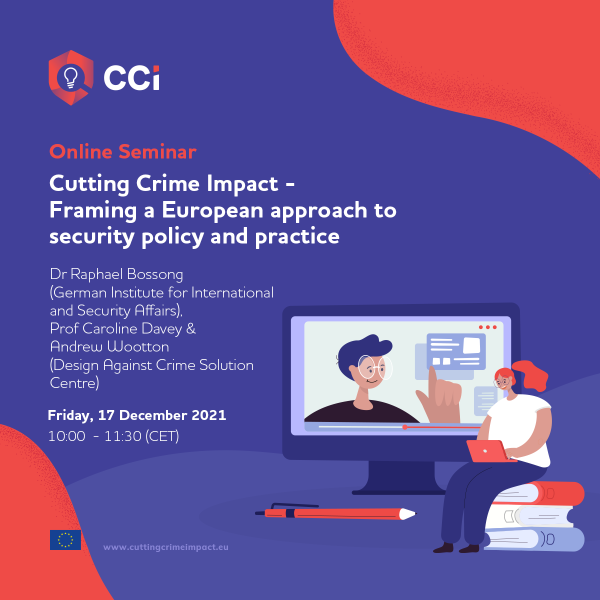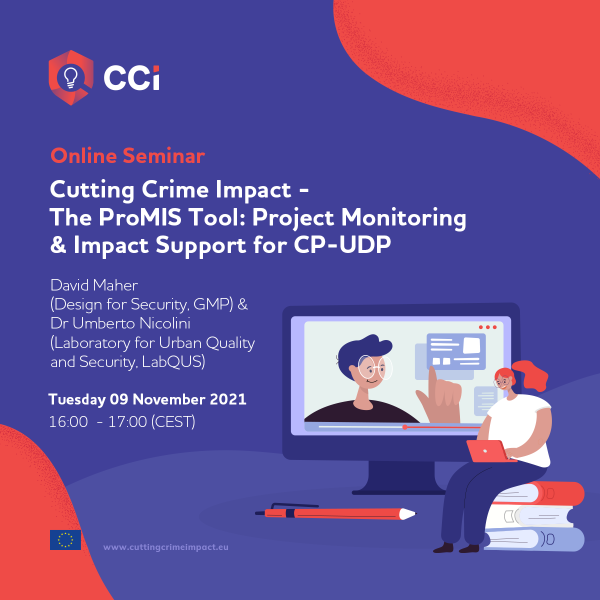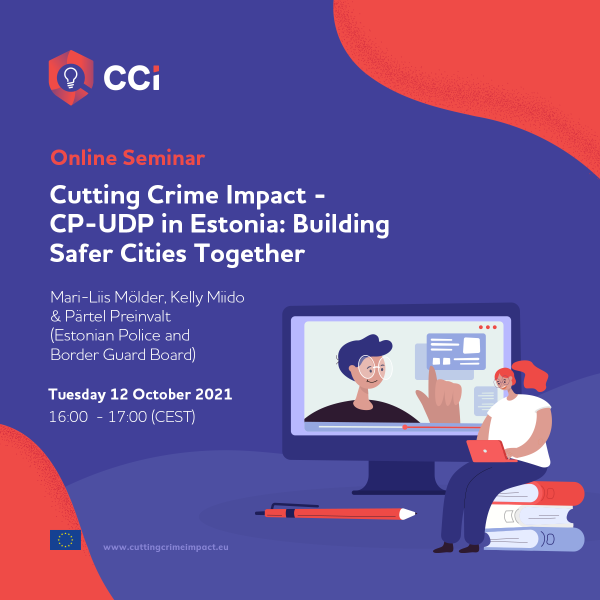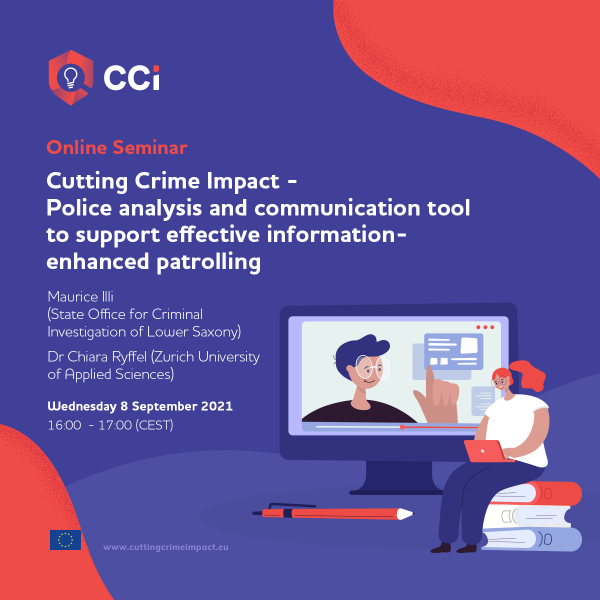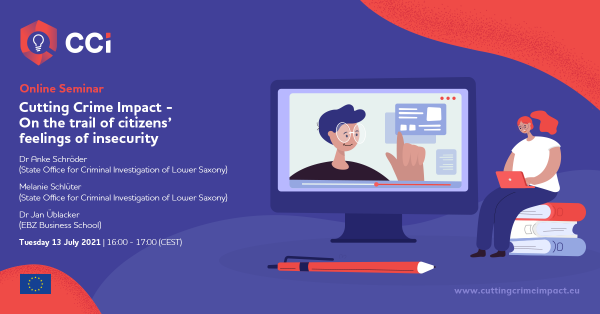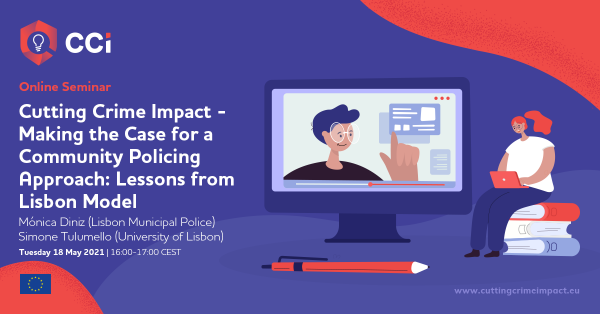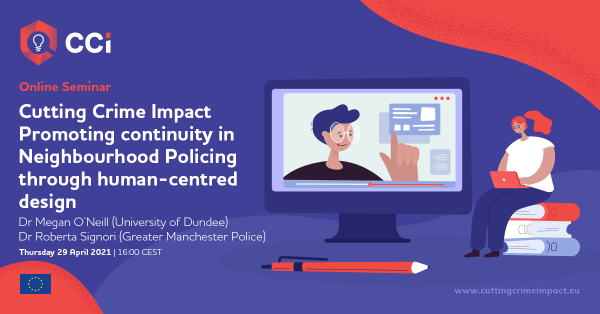Prävinare (Online-Seminare)
Seit 2016 bietet das Institut für angewandte Präventionsforschung (DPT-I) sogenannte Prävinare an. Prävinare sind Seminare im Themenfeld der Prävention, die online angeboten werden. Einzige Voraussetzung sind ein Computer und eine ausreichende Internetverbindung. Während des Online-Seminars wird ein Live-Video der Vortragenden und die Präsentation gezeigt. Die Teilnehmenden sind durch eine Chatfunktion interaktiv beteiligt und können Fragen und Kommentare posten. Diese Fragen werden seitens der Moderation gebündelt und den Vortragenden zur Diskussion gestellt.
Zu den Aufzeichnungen
- in der DPT-Dokumentation
- im DPT-YouTube-Kanal
- im Adobe Connect Event Catalog
- Prävinaraufzeichnungen des 25. DPT-Digital im DPT-YouTube-Kanal
- Prävinaraufzeichnungen des 25. DPT-Digital in der DPT-Dokumentation
- Prävinaraufzeichnung des 26. DPT in der DPT-Dokumentation
Prävinarreihe Cutting Crime Impact – CCI (März bis Dezember 2021)
Zu dem EU-Projekt Cutting Crime Impact (CCI) bot das DPT-I eine mehrteilige Prävinar-Reihe in englischer Sprache an. Im Zeitraum März bis Dezember 2021 gab es jeden Monat ein Online-Seminar aus dieser Reihe. Darin wurden die dort entwickelten Toolkits zur Prävention von Alltagskriminalität und die innovative methodische Forschungspraxis des Projektes vorgestellt.
CCI-Abschluss-Prävinar:
|
FREITAG, 17. Dezember 2021, 10-11:30 Uhr (CET) Cutting Crime Impact — Framing a European approach to security policy and practice mit Dr Raphael Bossong,
Die Vortragspräsentationen werden in Kürze hier zur Verfügung gestellt. |
Abstract
The EU-funded Cutting Crime Impact (CCI) project is coming to an end and so is the 10-part webinar series with the German Prevention Congress (DPT). The final webinar will give an overview of the CCI project over the past three years and an outlook on how project results can be used appropriately, wisely and sustainably.
We will start with a keynote by Dr Raphael Bossong, who will put the CCI Project into a European contemporary spirit. He will give us a brief overview of security policy in Europe up to the start of the CCI project and reflect on the European trends we are currently moving in. He will explore what is missing in the current European security policy regarding the fight against high-impact petty crime and how CCI can contribute to these challenges.
Afterwards, Professor Caroline Davey and Andrew Wootton, CCI Project Coordinators, will reflect on Cutting Crime Impact. Thinking back and looking forward: they will talk about lessons learned and future steps for CCI.
The need for a better defined European Security Model was outlined in the Horizon2020 research programme. CCI was asked to intergrate high-impact petty crime into the European Security Model. Yet research undertaken during the project found that a definitive European Security Model does not actually exist, therefore we created our own, new version of a European Security Model – a human-centred conceptualisation of security, which Professor Caroline Davey and Andrew Wootton will present in this webinar.
We will conclude the webinar with short statements from the Advisory Board Members who have accompanied and supported the project. We are looking forward to you joining us and your questions and comments.

Referent*innen / Speakers
Dr Raphael Bossong (German Institute for International and Security Affairs) - dieser Beitrag musste krankheitsbedingt leider ausfallen!
Prof Caroline L. Davey & Andrew B. Wootton (Design Against Crime Solution Centre),
as well as Partners and Advisory Board Members of the CCI project
Dr Raphael Bossong is an Associate at the German Institute for International and Security Affairs (SWP) where he is responsible for EU Justice and Home Affairs. Previously, he worked at the Institute for Peace Research and Security Policy and at the Global Public Policy Institute. His research fields include, EU counterterrorism policy, crisis management border security and effects of the migration crisis on the EU.
Professor Caroline Davey and Andrew Wootton are co-directors of the Design Against Crime Solution Centre — a unique design research partnership with Greater Manchester Police, the Landeskriminalamt Niedersachsen (DE) and DSP-groep b.v. (NL). For the past 20 years, Caroline and Andrew have led research into the use of evidence-based design to create human-centred product and service solutions to societal challenges. They are currently leading the €3m European Commission funded research programme Cutting Crime Impact (CCI), www.cuttingcrimeimpact.eu.
In collaboration with key stakeholders and industry partners, Caroline and Andrew led the research and product development work that resulted in ProtectED Community Interest Company (CIC)—a design-led social enterprise that seeks to improve the safety, security and wellbeing of university students by raising standards across the higher education sector (www.protect-ed.org). Caroline and Andrew have published widely on the use of human-centred design to address issues related to social responsibility, and were invited to author a volume of Gower's seminal Socially Responsible Design series. Design Against Crime: A human-centred approach to safety and security outlines the development of Design Against Crime in the UK, and its wider impact on design research, practice and policy across Europe.
|
Dienstag, 9. November 2021, von 16-17 Uhr (CEST) Cutting Crime Impact – The ProMIS Tool: Project Monitoring & Impact Support for CP-UDP mit Dr. Umberto Nicolini & David Maher
Präsentation von Dr. Umberto Nicolini Find further info and Crime Prevention Guidelines for urban planning and design in this handbook. |
Abstract
Design for Security (DfS) is a team of built environment professionals (architects, landscape architects & planners), within Greater Manchester Police (GMP) that provide security and crime prevention assessments of built environment design proposals. Engagement with DfS is a statutory requirement for developments seeking planning approval for 'major projects' in Greater Manchester.
As part of the EU funded Cutting Crime Impact project the ProMIS tool has been developed to support the DfS team, through enhanced project management and understanding the impact of CPTED within GMP. David will be presenting this tool. ProMIS will enable DfS to gain a much needed visual analysis of urban development across Greater Manchester; especially with regard to the growth and development of new communities, and their impact on infrastructure needs. With the use of Geographic information system mapping the tool will support long term tracking of historic DfS projects in a geographic context (i.e. mapping DfS projects across Greater Manchester), and their potential impact on future policing resourcing strategies.
Umberto will discuss the importance of early stage design interaction and CPTED alongside a case study. He will also provide a potted history of Design for Security during its inception.
Referent*innen / Speakers
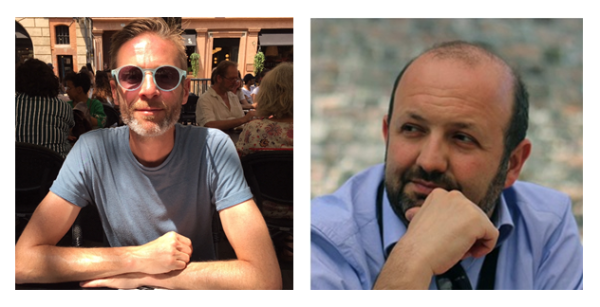
David Maher is an Architectural Designer with over 18 years’ experience of delivering buildings and public realm spaces across the UK & Ireland. Since joining Design for Security David has been a guest lecturer at Manchester School of Architecture and Anglia Ruskin University (Postgraduate Criminology), Cambridge - discussing the work of Design for Security and the merits of CPTED principles alongside his architectural and built environment experience.
Dr Umberto Nicolini is an Architect, born in Milan in the middle of the 70s. During his training years, he had the opportunity to meet Professor Clara Cardia, who at the time taught planning and design. Under her supervision, he took part in several projects on urban safety and quality of life. Engaged since the very beginning in implementing environmental crime prevention as an institutional tool in planning policies, Umberto has recently promoted and chaired the European Programme COST TU1203 – Crime Prevention Through Urban Design and Planning – as well as many other related projects.
|
CCI-Prävinar #8 Cutting Crime Impact – CP-UDP in Estonia: Building Safer Cities Together mit Mari-Liis Mölder, Kelly Miido & Pärtel Preinvalts
|
Abstract
The Estonian Police and Border Guard Board (PJP) have set as one of its strategic objectives the creation of a safe environment for their citizens. Creating a safe space is about preventing crime through the design of the environment. This requires a common understanding of the role of the Estonian Police within the urban development process, and for there to be communication and collaboration between the police and local planners, architects, designers and development companies.
During the Cutting Crime Impact (CCI) project PJP created the Building Safer Cities Together tool, with the aim of developing a comprehensive, methodical and collaborative approach for the development of safe spaces following CP-UDP principles. The tool comprises of a training programme, policy guide and process protocol to enable the Estonian police to support the effective planning, design and development of safe urban environments.
Referent*innen / Speakers
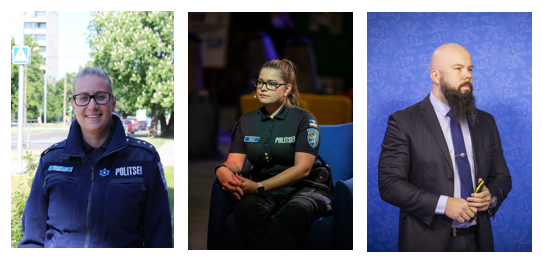
Mari-Liis Mölder is a prevention specialist at PJP who has worked in the police service for over 10 years. Mari-Liis will introduce the Building Safer Cities Together tool, present the various elements and how these support PJP in achieving their objective.
Kelly Miido works as a regional police officer at PJP. Kelly will focus on how the police implements the tool in their everyday work, presenting a case study of how the tool has been implemented in the design and development of Tondiraba Park in Talinn. She will talk about the different roles in designing safe urban environments and about cooperation with local partners.
Pärtel Preinvalt’s role at PJP is in the prevention of radicalisation leading to violent extremism within the context of law enforcement. One of the challenges his team face is the safeguarding safe public spaces. He will talk about non-traditional or unconventional security threats. When planning a safe environment, law enforcement can take steps that may disturb and alarm the community: for example building temporary barriers. In the case of preventing unconventional security threats, a balance is necessary. Although it is important to create an environment where citizens feel safe, It is also critical to mitigate security threats, by implementing integrated protection solutions which may at first glance alarm citizens. Pärtel will present how the Building Safer Cities Together tool supports his work in ensuring the safety of citizens at large public events and in the prevention of unconventional security threats.
|
CCI-Prävinar #7 Cutting Crime Impact — The Dutch touch: a problem-oriented approach to High Impact Crime (ProHIC) mit Armando Jongejan & Paul van Soomeren |
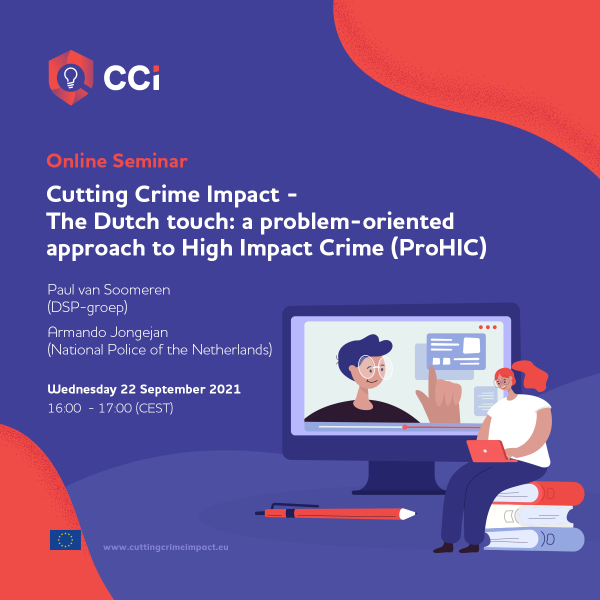 |
Abstract:
High Impact Crime (HIC) such as violent assault, robbery and burglary impact negatively on citizens and their communities. As part of the EU funded Cutting Crime Impact project (www.cuttingcrimeimpact.eu) a comprehensive, problem-oriented approach to HIC has been developed in the Netherlands by the national police, ministry, municipalities and a private research and consultancy bureau. This approach is called ProHIC. It provides methods and solutions to address HIC through a detailed manual, support materials and evidence-based ‘pearls of knowledge’ all available on www.ProHIC.nl.
The approach outlines a practical process for police, local authorities, residents and entrepreneurs to tackle High Impact Crime together. It starts with a thorough analysis of the problem by all stakeholders to determine precisely what the problem is, before deciding on the appropriate intervention. Defining and analysing the problem is key to the efficacy of a collaborative solution. ProHIC guides the stakeholders through the collaborative process from problem identification (scanning and analysis) to developing an action plan and evaluating it. It supports the police, relevant local and national authorities, residents and businesses to reduce and, where possible, prevent these crimes from happening.
Referent*innen / Speakers
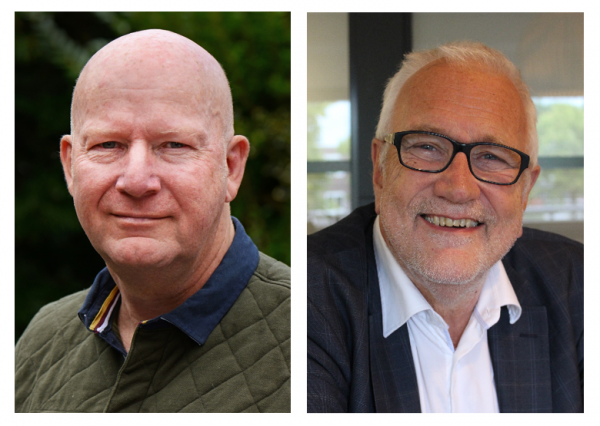
Armando Jongejan MSc studied at the University of Amsterdam. Armando Jongejan started working at the National Police of the Netherlands as a project, process, information and innovation manager. Today he is head of a Business Intelligence Division. Since 1995 he is involved with Crime Prevention Through Environmental Design. He has presented at numerous European and USA CPTED seminars and conferences and has written several international articles about the Dutch Police Label Secure Housing.
Paul van Soomeren is founder of the Amsterdam based research and consultancy bureau DSP (www.DSP-groep.eu). Paul van Soomeren worked at the national Bureau of Crime Prevention in the Netherlands for several years and is considered an international expert in Crime Prevention, specifically in Crime Prevention through Environmental Design (CPTED). At the moment Paul van Soomeren works on standardisation of CPTED and participates in the projects like Secu4All, the European Urban Agenda and Cutting Crime Impact.
|
CCI-Prävinar #6 Cutting Crime Impact — Police analysis and communication tool to support effective mit Maurice Illi & Dr Chiara Ryffel
Zur Aufzeichnung |
Abstract
"The single biggest problem in communication is the illusion that it has taken place." George Bernard Shaw
As part of the EU-funded Cutting Crime Impact (CCI) project, the State Office of Criminal Investigation (LKA) in Lower Saxony, Germany, investigated the implementation and front-line use of Predictive Policing with the aim to identify issues and address shortcomings. Researchers conducted observation and interview research into the use of the LKA's PreMAP predictive system by police officers. Findings revealed that predictive data was not being used as it was not provided in a way that met the needs of officers. In addition, research found that PreMAP data was just one of many types of information that needed to be provided more systematically to officers in daily patrol briefings and shared between shifts. Observational research highlighted the fact that shortcomings in the implementation of PreMAP were not simply due to the technology, but to relevant information not being communicated in a way that supported officers in their patrolling duties.
From these insights, the LKA researchers designed and developed their PATROL Tool. This Tool is tailored to the local policing context, and includes various elements that support comprehensive information processing and more effective internal communication, enabling an intelligence-enhanced approach to patrolling.
Maurice Illi will present the PATROL tool, discussing the research that led to its development, how it works and how it supports police officers to more effectively receive, share and use information.
Dr Chiara Ryffel will present on the critical importance of information in decision-making and taking effective action. She will discuss how poor communication and a lack of information in High Reliability Organisations (HRO) can result in inadequate actions that in turn lead to critical incidents. The more precise and comprehensive information is, the better a situation can be assessed and appropriate action identified and taken. This is especially important in emergency situations where decisions and actions must be taken speedily. By focusing on providing employees with the information, resources and equipment they need, organisations can better create and enhance safety.
Referent*innen / Speakers
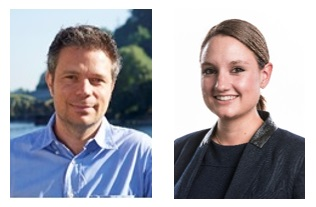
Maurice Illi is a sociologist and works as a consultant for urban security at Basler & Hofmann AG in Zurich. Since 2021, he has been involved in the EU-funded Cutting Crime Impact (CCI) project at the Competence Center for Urban Security (KURBAS) at the State Office of Criminal Investigation (LKA) in Lower Saxony, Germany. From 2014 to 2016, he was a private lecturer in sociology, social policy and social work at the University of Fribourg. From 2007 to 2020, he was security manager of the city of Lucerne and, among other things, project manager of the Lucerne security reports. He has extensive experience in solving conflicts of use in public spaces.
Dr Chiara Ryffel works as a psychologist and human factors specialist in an assessment centre for High Reliability Organisations (HRO) at the Centre for Diagnostics, Traffic and Safety Psychology (ZDVS) at the Zurich University of Applied Sciences (ZHAW). Previously, she was a lecturer, research associate and project manager at the Centre for Aviation (ZAV) at ZHAW where she conducted research in the field of human performance and developed simulation-based training for HROs.
Bisherige CCI-Webinare
Die ausführlichen Infos und die Präsentationen finden Sie in der DPT-Dokumentation.
Für die Aufzeichnung (YouTube-Video) klicken Sie auf die jeweilige Grafik.
CCI-Prävinar #5 vom 13.7.2021
CCI-Prävinar #4 vom 15.6.2021

CCI-Prävinar #3 vom 18.5.2021
CCI-Prävinar #2 vom 29.4.2021
CCI-Prävinar #1 vom 2.3.2021
Wie funktioniert eigentlich ein Online-Seminar? Erfahren Sie mehr in unserem kurzen Erklärfilm. 


